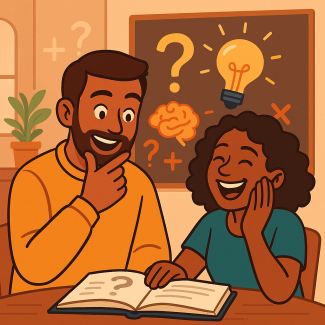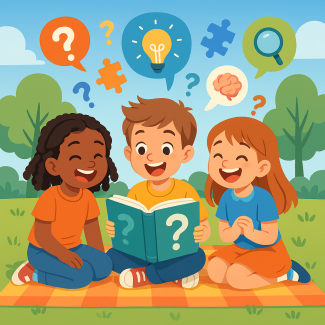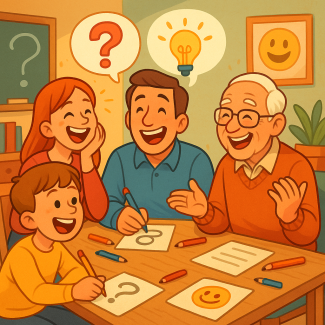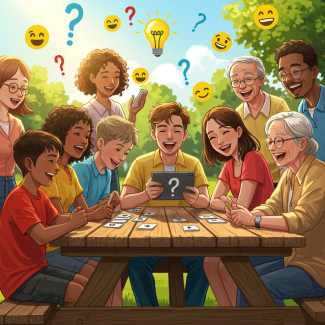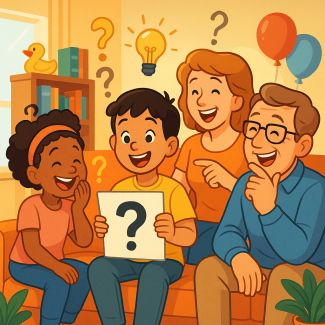
Hilarious Brain Teasers That Will Make You Laugh and Think
What Makes a Riddle Funny?
A funny riddle is more than just a play on words. It’s a cleverly crafted puzzle designed to tease the brain and deliver a punchline that catches you off guard. The best ones combine wit, misdirection, and lighthearted humor to produce a chuckle-worthy experience.
Unlike traditional riddles that focus solely on logic or intellect, humorous riddles blend logic with comedy, making them enjoyable for both children and adults. Whether you’re looking to lighten the mood at a party or entertain your kids, these riddles are sure to deliver.
How to Enjoy Funny Riddles to the Fullest
Keep the Atmosphere Light
The key to getting the most out of funny riddles is to create an environment where laughter is welcome. Share them in casual settings—family gatherings, classroom icebreakers, or even during a work break.
Embrace the Absurdity
Part of what makes funny riddles with answers so entertaining is their often nonsensical nature. They play with expectations, twist meanings, and sometimes just make no sense at all—and that’s the point!
Engage Your Audience
Make it interactive. Pose the riddles aloud, let others guess, and encourage wild answers. The journey to the correct (or incorrect) punchline is just as fun as the riddle itself.
Top 10 Funny Riddles with Answers
Let’s dive into the list of the top 10 funniest riddles that promise to tickle your funny bone.
1. The Chicken Dilemma
Riddle: Why did the chicken go to the seance?
Answer: To talk to the other side.
This riddle takes a classic setup and gives it a paranormal twist, blending a familiar joke with wordplay for a laugh-worthy result.
2. The Calendar Question
Riddle: What’s the best day to cook?
Answer: Fry-day.
This pun-based riddle is simple but always manages to get a groan and a giggle. Perfect for ending the work week with a smile.
3. The Invisible Man’s Problem
Riddle: Why can’t you give the invisible man a job?
Answer: Because he won’t be seen working!
This joke lands by playing with double meanings, making it a great example of wordplay humor in riddles.
4. The Music Note Mystery
Riddle: Why did the note go to jail?
Answer: Because it got caught in a treble!
This one is especially amusing for music lovers, delivering a pun that sounds both clever and ridiculous.
5. The Coffee Conundrum
Riddle: How does Moses make his coffee?
Answer: Hebrews it.
Biblical humor meets morning routine in this classic pun that always gets laughs—especially at breakfast tables.
6. The Math Teacher’s Nightmare
Riddle: Why was the math book sad?
Answer: Because it had too many problems.
Simple, punny, and very relatable—this is a timeless favorite among students and teachers alike.
7. The Bear’s Beverage
Riddle: What do you call a bear with no teeth?
Answer: A gummy bear.
This one gets bonus points for being adorable and funny, and it’s a hit with kids.
8. The Pirate’s Query
Riddle: Why couldn’t the pirate play cards?
Answer: Because he was sitting on the deck.
Ahoy! This nautical pun gets a laugh every time and is great for pirate-themed parties or kids’ storytime.
9. The Lightbulb Gag
Riddle: How many tickles does it take to make an octopus laugh?
Answer: Ten-tickles.
A groaner of a pun, but undeniably funny. This riddle plays on the word “tentacles” with a twist.
10. The Sleepy Computer
Riddle: Why was the computer cold?
Answer: Because it left its Windows open!
Tech humor meets household logic in this cleverly modern joke that always finds its mark.
Why We Love Funny Riddles
They Relieve Stress
Laughter has been proven to lower stress levels, improve mood, and even boost the immune system. Funny riddles offer a quick, accessible way to tap into that joy.
They Enhance Social Bonds
Sharing a riddle creates a moment of connection. Whether it's stumping a friend or laughing over a silly answer, these exchanges foster communication and camaraderie.
They Stimulate the Brain
Even humorous riddles engage the brain’s problem-solving faculties, encouraging lateral thinking and creativity.
Crafting Your Own Funny Riddles
Step 1: Choose a Familiar Topic
Start with a subject people know—food, animals, school, work, etc. This grounds the riddle and gives you material for wordplay.
Step 2: Add a Twist
Think of unexpected connections or double meanings. The humor often lies in the surprise.
Step 3: Keep It Short and Snappy
A good riddle is concise. Avoid long setups. You want your audience to focus on the punchline.
Step 4: Test It Out
Try your riddle on friends or family. If it gets a laugh (or even a groan), it’s a keeper!
Where to Use Funny Riddles
In the Classroom
Teachers can use funny riddles to kickstart the day or reward students with a giggle-worthy break.
During Family Time
Include a riddle before dinner or while driving—kids love guessing the answers, and parents enjoy the clean humor.
In the Workplace
Breakroom boredom? Brighten up meetings or start team-building sessions with a clever riddle.
On Social Media
Post a riddle of the day and engage your followers. It’s a fun way to build community and share smiles.
Age-Appropriate Humor: Clean and Clever
For Kids
Stick to simple riddles with animals, food, or everyday objects. Visual humor and basic puns work best.
For Teens
Mix in a bit more sarcasm and pop culture. Teen audiences appreciate witty and slightly edgy jokes.
For Adults
More layered wordplay and references to work, relationships, or current events can elevate the humor without losing the light tone.
More Funny Riddles to Try
Here are some extra laugh-worthy riddles to keep the fun going:
- Why don’t skeletons fight each other? They don’t have the guts.
- What did one wall say to the other? I’ll meet you at the corner.
- What do you call cheese that isn’t yours? Nacho cheese.
- What do you call a factory that makes okay products? A satisfactory.
- Why don’t scientists trust atoms? Because they make up everything.
Final Laughs: The Joy of Wordplay
Funny riddles are proof that humor doesn’t have to be complicated. A well-placed pun or twist in logic can elicit a genuine smile or hearty laugh. In a world that often feels too serious, a silly riddle is a small but powerful reminder of the joy in wordplay.
So next time you’re looking for a mental pick-me-up or a way to connect with others, don’t underestimate the power of a good riddle. Whether you're a kid, a parent, a teacher, or just someone who loves to laugh, there's a riddle out there waiting to make your day.

